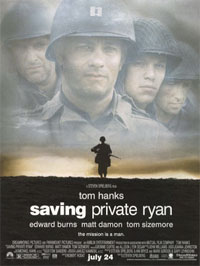Saving Private Ryan

Behind the Lines
When the company came home to Los Angeles, post production on "Saving Private Ryan" was completed, with Spielberg working closely with his longtime editor Michael Kahn.
However, one integral element of the film was accomplished on the opposite coast in Boston Symphony Hall. There, composer John Williams conducted the renowned Boston Symphony Orchestra and the Tanglewood Festival Chorus as they recorded his score for "Saving Private Ryan."
Williams and Spielberg mutually decided which scenes should have music. To accompany the journey of Miller and his squad, they chose to have the music flow out in long sequences, followed by scenes with no music at all. Over the closing credits, they selected "Hymn to the Fallen," with a haunting cadence of military drums.
Spielberg reveals that he was so moved when he heard the music for the first time that he could imagine the audience just sitting...listening in a darkened theatre.
"I think it's very important to communicate to an audience that mere mortals--flesh and blood human beings--had to be called upon to make this sort of sacrifice," Hanks notes. "And, in that way, I think we are doing a bit of a service to them...not through a history lesson, but through a humanity lesson."
Author Stephen Ambrose offers, "The search for Private Ryan is fiction, but of the kind that illuminates truth rather than diminishing it. Everything about the story is accurate to the smallest detail: clothes, weapons, language, relationships between men who trained together and newcomers and between officers and enlisted men...the movie catches these nuances exactly. These are the men I have been interviewing for 30 years, the men I wrote about in D-Day and Citizen Soldiers."
"Making a war movie isn't glamorous to me," Spielberg reflects. "My dad brought home stories of the war, and he always explained to me how unglamorous war is. What I tried to do in this film was approximate the look and the sounds and even the smells of what combat is really like."
Prev | Page 1 | Page 2 | Page 3 | Page 4 | Page 5
Notes
Although Stephen Ambrose is listed as a historical consultant for the film, he was not actively involved during the actual production. Numerous books of his were used as reference sources, but Ambrose himself was never directly contacted by the film's production staff.

